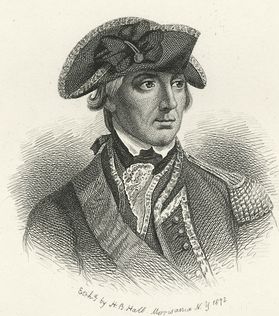General William Howe is one of most well known British generals from the Revolutionary War. As is the case with all generals, General Howe had his ups and downs over the years. He was very successful toward the beginning of his career in America, but toward the end, his reputation had become damaged due to a great deal of losses.
William Howe was born to Emanuel and Charlotte Howe on August 10, 1729. His father was a General in the king’s army, and was also the illegitimate uncle of King George III. You see, William Howe’s grandmother (or Emanuel Howe’s mother) was the lover of King George I, who was the grandfather of King George III. She became pregnant through an affair with George I and gave birth to Emanuel Howe. This made King George III William Howe’s first cousin.
Early Military Life
When William Howe was 17 years old he joined the millitary, following the example of his two older brothers. This was September of 1746. In 1747 he was promoted to lieutenant, and by the time 1750 rolled around, our boy was a bright young captain at the age of 21. During that time, he made friends with Major James Wolfe. Little did they know that in a few short years they would be waging war against the American colonies together.
When the French and Indian War came, there were new openings in the military for men everywhere. Howe was among the ones given a chance at this point, as he was appointed Major over a recently formed regiment. He won most of the battles he fought during that war, and soon became very popular amoung his army friends.
That summer, William’s brother, General George Howe, was killed in the battle of Carillon. Because of this tragedy, William Howe recieved a seat at Parliament, replacing his brother and representing Nottingham.
Later that summer, Howe agreed to help his friend General Wolfe attack Quebec in 1759. Their success gave Howe a good name, and he was promoted to Lieutenant Colonel that December. Most of his time that winter was spent defending Quebec or fighting in another part of the colonies. At the conclusion of the winter, he traveled home to England.
After returning to England, he was assigned as Colonel of a regiment leaving for Ireland in 1764. Four years later he was appointed governor of the Isle of Wight. In 1772 Howe was recognized as a gifted leader and was, therefore, promoted to major general. Soon after, General William Howe was asked to take over training the light infantry of the British Army, a task which he accepted with great pleasure.
Politics
In Parliament, General William Howe fought against the Intolerable Acts. He argued vehemently that they should make peace with the American Colonies. He publicly stated, several times, that he did not agree with the war against the Americans.
In spite of this he agreed to take a position in one of the regiments going over to America, saying he was ordered by his commanding officers who were commanded by the king, so it was his duty and he had no choice.
Revolutionary War
General William Howe arrived in the middle of the Siege of Boston with Generals Henry Clinton and John Burgoyne on May 25, 1775. They brought reinforcements for General Thomas Gage. Upon arriving, they were immediately forced into the action.
After the Siege of Boston and the Battle at Bunker Hill, the American colonies lost their favor in his eyes. He would no longer fight in their defense in Parliament.
At the start of the war, his record showed roughly an even ratio of wins to losses, but then he started a severe losing streak. After losing the chance to take Washington captive twice during the battle of Princeton, he was overrun by the Americans almost everytime he fought them.
After Howe had made a series of terribly wrong mistakes and miscommunications, the people of England began to speak badly of him. He felt he had lost the king’s favor. Furthermore, he had lost faith in himself. Soon after, he turned in his resignation and was released three days later.
April 4, 1778 was the day he was released. He did not serve as a general again.
Final Years
General William Howe later started training other people to fight as he had once done when he was much younger. With the outbreak of the French Revolution later, he had a great deal of work to do. Much later, he served as governor to Plymouth, where he remained until he died on July 12, 1814 at 84 years of age.



